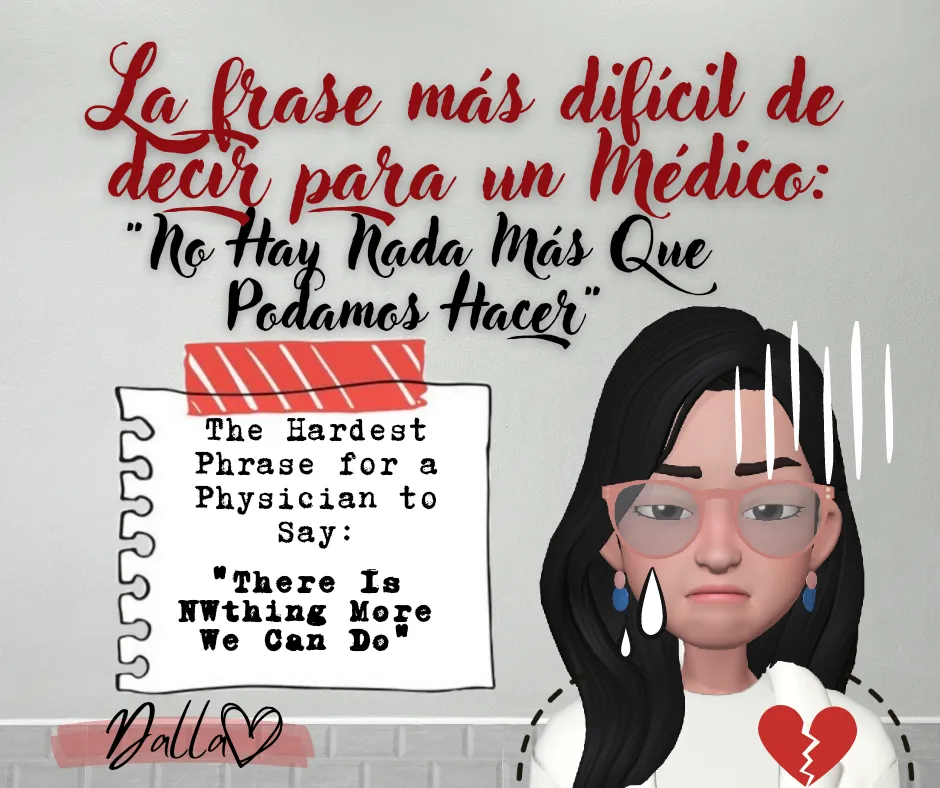

Ya saben que a veces hago este tipo de post para desahogarme de una que otra situación personal, que nada tiene que ver con educación psicológica, este en especial es para que más o menos comprendan por lo que debemos pasar los médicos cuando tenemos que decir ciertas cosas dolorosas a familiares de pacientes, cuando no sabemos qué más hacer para ayudar.
Algunas personas piensan que los médicos no tenemos muchos sentimientos, que somos fríos, que no nos importan los pacientes, que hemos perdido toda la humanidad, sobre todo en este país donde el sistema de salud es un completo desastre y en él quedamos atrapados nosotros con nuestra profesión, recayendo toda la carga física y emocional del desastre completamente sobre nosotros.
Terminamos siendo los culpables de todo, terminamos siendo el blanco fácil de todas las críticas de un montón de personas que se olvidan de que la dirección de ese sistema de salud no depende de nosotros, ni la dotación de hospitales y mucho menos que no haya el suficiente personal para atenderlos.
Algunos prefieren soportar, prefieren enfocarse en su vocación y servir, sí, servir sin pedir casi nada a cambio más que respeto por su profesión y por solo ser seres humanos, pero al final terminan tan decepcionados que se rinden, por eso es que vemos en los hospitales principalmente médicos jóvenes, los recién graduados, los que aún sueñan ejercer en el lugar que tanto soñaron haciendo lo que tanto desearon.
Pero los que tenemos un tiempo más de graduados hemos aprendido, hemos llevado muchos golpes y la experiencia nos hizo entender que para sobrevivir en este país debíamos priorizar nuestra salud física y mental por encima de la vocación. Esos jóvenes recién graduados están en ese proceso de aprendizaje y es por eso que terminan recubriéndose de corazas de protección para que el medio hostil no los consuma, por eso se vuelven muchos duros, fríos y al final terminan abandonando el sistema público o sencillamente yéndose del país.
¡Créanme amigos! tener que ir todos los días a un campo de batalla sin ningún armamento ¡es difícil! ¡es titánico! porque las guerras terminan en algún momento, pero esta guerra ya lleva más de 22 años en este país y no se vislumbra ninguna rendición. Hablo de "guerra" porque lo que se vive en los hospitales de este país es violencia, violencia pura y dura, sobre todo psicológica para todo el que entre ahí, sea quien sea, pacientes, familiares, personal de trabajo ¡el que sea!
You know that sometimes I do this kind of post to vent about some personal situation or other, which has nothing to do with psychological education, this one in particular is so that you can more or less understand what we doctors have to go through when we have to say certain painful things to patients' relatives, when we do not know what else to do to help.
Some people think that we doctors do not have many feelings, that we are cold, that we do not care about patients, that we have lost all humanity, especially in this country where the health system is a complete disaster and we are trapped in it with our profession, with all the physical and emotional burden of the disaster falling completely on us.
We end up being the ones to blame for everything, we end up being the easy target of all the criticism from a lot of people who forget that the direction of that health system does not depend on us, nor the endowment of hospitals and much less that there are not enough staff to attend them.
Some prefer to endure, prefer to focus on their vocation and serve, yes, serve without asking for almost nothing in return other than respect for their profession and for just being human beings, but in the end they end up so disappointed that they give up, that is why we see in hospitals mainly young doctors, the newly graduated, those who still dream of practicing in the place they dreamed so much doing what they wanted so much.
But those of us who have been graduates for a while have learned, we have taken many knocks and the experience made us understand that in order to survive in this country we had to prioritize our physical and mental health over our vocation. These young recent graduates are in this learning process and that is why they end up covering themselves with protective armors so that the hostile environment does not consume them, that is why many become hard, cold and in the end they end up leaving the public system or simply leaving the country.
Believe me, friends, having to go every day to a battlefield without any weapons is difficult, it is titanic, because wars end at some point, but this war has been going on for more than 22 years in this country and no surrender is in sight. I speak of "war" because what is experienced in the hospitals of this country is violence, violence pure and simple, especially psychological violence for everyone who enters there, be it patients, family members, staff, whoever!

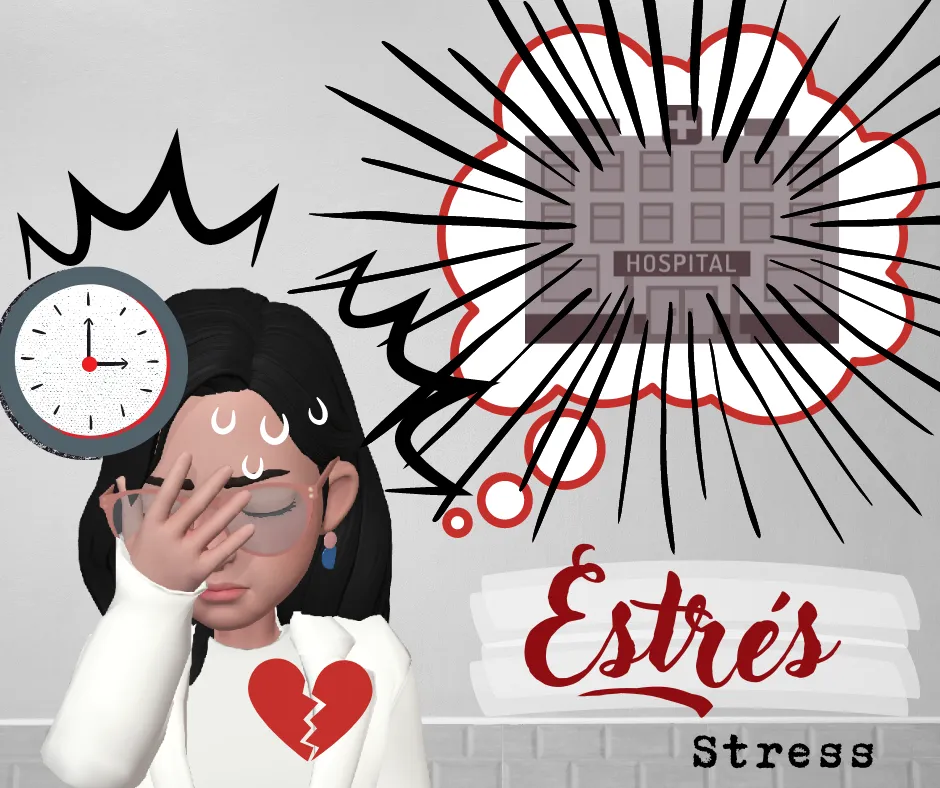

Yo por ese aprendizaje que obtuve, decidí hace un poco más de 6 años después que me gradué de especialista, ejercer en el sector público de salud, pero en un hospital pequeño y solo en el área de consulta. No era porque no quiera ayudar, al contrario, me he querido manteniendo ayudando a la población de mi país sin recibir nada a cambio, pero, repito, decidí priorizar mi salud física y mental para poder quedarme en el país al lado de mi familia que es lo más importante para mí.
Esto que les cuento es con la intención de que comprendan mi posición, y la de otras muchas personas que ejercen en el sector de salud del país; por supuesto también hay los malos de corazón, los malos de verdad, como en todos lados, pero ¡créanme! ¡los buenos en este sector somos más!
Todo este preámbulo es para que sepan por lo que he pasado, la razón por la que he decidido mantenerme alejada de los conflictos y es que soy una persona al extremo empática, por eso, a diferencia de otros, yo no ejerzo en el hospital más grande de mi región, no porque me haya envuelto en esa coraza y me haya convertido en ese ser al extremo frío y duro, es precisamente porque nunca pude hacerlo, ni tampoco quise.
Así que como comprenderán por mi sensibilidad es aún más difícil decir esas palabras que ven en el título de este post "No hay nada más que podamos hacer" Esta frase debí decirla muchas veces a lo largo de mi ejercicio médico, de hecho, una de las múltiples razones por las cuales escogí ser Geriatra, fue para que el impacto de ella no fuera tan fuerte para los familiares, pero, sobre todo, para mí.
Se supone que el haber vivido hasta ser adulto mayor hace que el entorno familiar acepte más fácilmente esta frase, porque no es lo mismo decirle esto a una madre de un niño o a un padre de una familia. Ese momento es ¡completamente desgarrador! es una condena psicológica para esa persona en un momento de mucho sufrimiento físico probablemente por el dolor, una persona que tenía toda una vida por delante y que, tristemente, no va a poder terminarla como quería.
El adulto mayor así fallezca en una edad relativamente joven (60 años, por ejemplo) ya vivió bastante de su vida y "se supone" que el proceso de aceptación es muchísimo más fácil, sobre todo para los familiares que son los que al final cargan con todo el proceso doloroso cuando el enfermo ya no está. Esto es lo más común que veo en Geriatría, el duelo progresa más rápidamente, duele por igual, pero las etapas se acortan.
Because of the learning I gained, I decided a little more than 6 years ago, after I graduated as a specialist, to work in the public health sector, but in a small hospital and only in the consultation area. It was not because I did not want to help, on the contrary, I wanted to keep helping the population of my country without receiving anything in return, but, I repeat, I decided to prioritize my physical and mental health in order to stay in the country with my family, which is the most important thing for me.
What I am telling you is with the intention of making you understand my position, and that of many other people who work in the health sector of the country; of course there are also the bad ones at heart, the really bad ones, as everywhere, but believe me, there are more of us good people in this sector!
All this preamble is to let you know what I have been through, the reason why I have decided to stay away from conflicts and that is because I am an extremely empathetic person, that is why, unlike others, I do not work in the largest hospital in my region, not because I have wrapped myself in that armor and have become extremely cold and hard, it is precisely because I could never do it, nor did I want to.
So, as you will understand because of my sensitivity, it is even more difficult to say those words you see in the title of this post "There is nothing more we can do" This phrase must have been said many times throughout my medical practice, in fact, one of the many reasons why I chose to become a Geriatrician, was so that the impact of it would not be so strong for family members, but, above all, for me.
It is assumed that having lived to be a senior citizen makes the family environment accept this phrase more easily, because it is not the same to say this to a mother of a child or a father of a family. That moment is completely heartbreaking! It is a psychological condemnation for that person in a moment of great physical suffering, probably due to pain, a person who had a whole life ahead of him/her and who, sadly, will not be able to finish it as he/she wanted.
The older adult, even if he/she dies at a relatively young age (60 years old, for example), has already lived enough of his/her life and "it is assumed" that the process of acceptance is much easier, especially for the relatives who are the ones who in the end have to bear the entire painful process when the sick person is no longer there. This is the most common thing I see in Geriatrics, grief progresses more quickly, it hurts equally, but the stages are shortened.

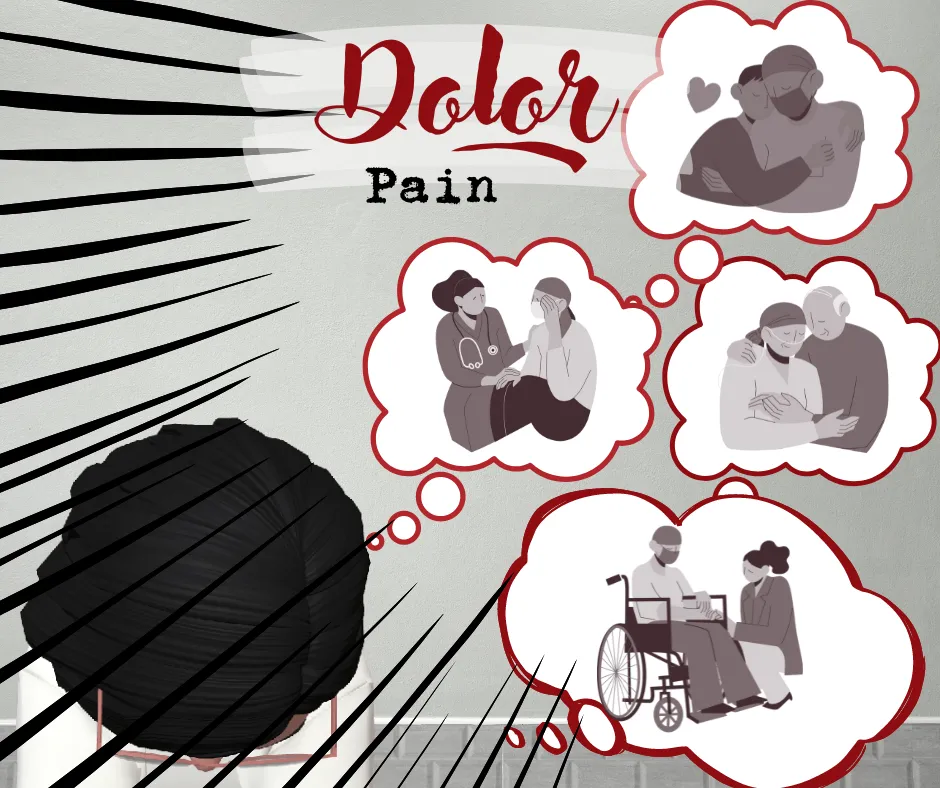

Estas 2 últimas semanas he tenido que lidiar con algo que se sale de esa frecuencia y de esa razón por la cual escogí esta especialidad. Un proceso que no se acorta, un duelo que no termina, porque la persona enferma parece negarse a irse aun cuando ya ha vivido lo suficiente y a este punto solo queda mucha carga sobre los familiares que no saben qué hacer y siendo completamente honesta con ustedes ¡yo tampoco!
Una persona de 105 años amigos, en mi ejercicio profesional no había conocido a una persona tan longeva y que, de paso, estuviera en desahucio desde hace tantas semanas, pero no quisiera aun irse, y digo "quisiera" porque es lo que parece, ya que ella no lo verbaliza, su estado de consciencia no se lo permite, pero es lo que yo termino comprendiendo.
Ha sido tanto el sufrimiento familiar que su hija me habló de la Eutanasia, porque están ella y su hermana agotadas física y mentalmente. Desde que estudié la carrera siempre estuve a favor de la eutanasia, he visto muchas personas sufrir durante largos periodos de tiempo, ellos mismos pidiéndola para dejar de sufrir, así que siempre he estado a favor de ella cuando el paciente conscientemente lo pide para dejar de sentir dolor físico o mental y siempre lo pensé como algo mucho más viable para una persona de tercera edad y más si tiene 105 años.
Pero esta semana me he replanteado todo esto, la señora tiene momentos de lucidez donde pide agua y llama a personas, no está inconsciente todo el tiempo, tiene episodios diarios donde habla y se queja de dolor, por eso le indiqué ansiolíticos y analgésicos fuertes para mitigar todo eso y que secundariamente pudiera descansar en algún momento, tomando en cuenta que estos psicotrópicos tienen efectos adversos severos en estos casos.
La realidad es que en mi interior esperé que aliviara el dolor, aliviara el malestar y si ocurría el efecto adverso no deseado, es decir aumentar la probabilidad de mortalidad, ocurriera, pero sobre la base de que lo indiqué sopesando el beneficio sobre el riesgo, solo eso, es decir concienticé que fue un efecto que no busque directamente, sino otros por encima de él.
Cuando la hija de la Sra. empezó a hablarme de la Eutanasia de repente me replantee un montón de cosas que había pensado con anterioridad casi toda mi vida y me vi mentalmente en un momento donde yo estaría inyectando vía endovenosa o intramuscular algo a una persona para literalmente acabar con su vida sin su consentimiento y ¡se los juro! quede en absoluto ¡shock!
These last 2 weeks I have had to deal with something that is out of that frequency and out of that reason why I chose this specialty. A process that is not shortened, a mourning that does not end, because the sick person seems to refuse to leave even when they have lived long enough and at this point there is only a lot of burden left on the family members who do not know what to do and being completely honest with you, neither do I!
A person of 105 years old friends, in my professional practice I had never met a person so long-lived and who, by the way, had been in eviction for so many weeks, but she still would not want to leave, and I say "would" because that is what it seems, since she does not verbalize it, her state of consciousness does not allow it, but that is what I end up understanding.
The family suffering has been so great that her daughter talked to me about Euthanasia, because she and her sister are physically and mentally exhausted. Since I studied the career I have always been in favor of euthanasia, I have seen many people suffer for long periods of time, themselves asking for it to stop suffering, so I have always been in favor of it when the patient consciously asks for it to stop feeling physical or mental pain and I always thought it as something much more viable for a senior citizen and more if he/she is 105 years old.
But this week I have rethought all this, the lady has moments of lucidity where she asks for water and calls people, she is not unconscious all the time, she has daily episodes where she talks and complains of pain, that is why I prescribed anxiolytics and strong analgesics to mitigate all that and that secondarily she could rest at some point, taking into account that these psychotropics have severe adverse effects in these cases.
The reality is that in my heart I hoped that it would alleviate the pain, alleviate the discomfort and if the undesired adverse effect occurred, that is to say, increase the probability of mortality, it would occur, but on the basis that I indicated it weighing the benefit over the risk, just that, that is to say, I realized that it was an effect that I was not looking for directly, but others over and above it.
When her daughter started talking to me about Euthanasia, I suddenly rethought a lot of things that I had previously thought almost all my life and I mentally saw myself in a moment where I would be injecting intravenously or intramuscularly something to a person to literally end his life without his consent and I swear to you! I was in absolute shock!

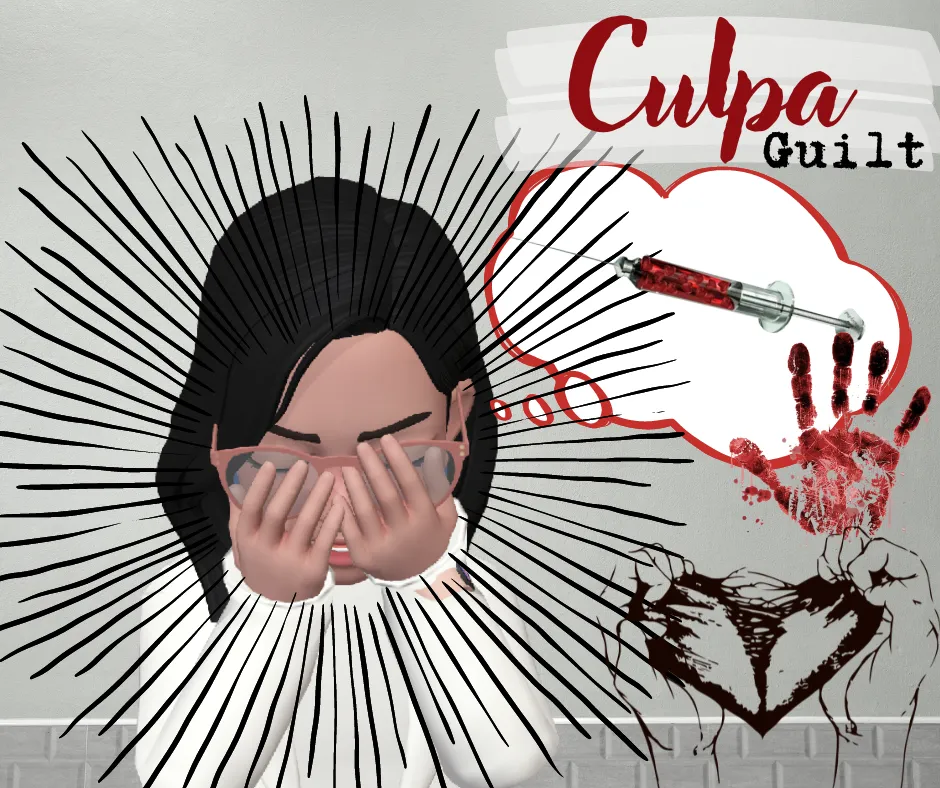

Me dije ¿Dalla tú vas a hacer eso?, ¿Vas a asesinar a una persona que ni siquiera lo ha pedido?, ¿Lo harías si lo pidiera? Y ahí entendí que definitivamente no estoy preparada para eso y de repente me acordé de este enfermero que inyectó a un montón de pacientes con insulina porque "según él" era lo mejor para ellos y en la película nos presentaron casos donde realmente si era lo mejor para esos pacientes porque estaban en muy malas condiciones y sufriendo.
Esa película "El Ángel de la Muerte" la critiqué por haber puesto esas escenas donde básicamente nos inducía a la comprensión de ese asesino; ese personaje lo odié, de hecho, hice una reseña sobre ella en mi blog y critiqué a la dirección por haber escogido justamente esos pacientes entre otros 400 asesinatos que cometió ese enfermero.
Pero cuando de repente me vi envuelta en todo ese shock sobre la eutanasia que les cuento, por momentos comprendí esos casos y entendí el por qué los directores decidieron poner esas escenas en la película, aun cuando fueran a generar en algunos detallistas y trabajadores del área de salud, como yo, el rechazo.
No me malinterpreten, no es que estoy de acuerdo ahora con el asesino, estoy hablando de que la persona que haga ese tipo de actos definitivamente debe tener algo de la psique de ese personaje, porque es básicamente despojarte de toda culpa, de empatía, de todo lo moralmente aprendido durante toda tu vida, de toda la educación universitaria aprendida, de hecho, siento que es despojarse un poco de algo de tu humanidad, porque debes dejar a un lado tu sensibilidad.
Así que eso que siempre había pensado en el pasado definitivamente cambió completamente en mi mente esta semana, y dije: definitivamente si se va a legalizar la eutanasia en este país en alguna oportunidad, espero que no nos pidan a todos que lo hagan, porque no siento que tenga la preparación psicológica para hacerlo, ni la vaya a tener en algún momento.
Es que solo me imagino en ese momento que los familiares se queden tranquilos al despedirse de su familiar, pero luego me dejen a mí con el paciente para yo inducirle su muerte ¡se los juro! que solo imaginar la escena es horrorosa, me da terror, náuseas, ansiedad, siento que llegaré a mi casa a vomitar y en crisis de llanto toda la semana por haber acabado yo con una vida con mis propias manos ¡que horrible el sentimiento amigos!
I said to myself, are you going to do that, are you going to murder a person who hasn't even asked for it, would you do it if he asked for it, would you do it if he asked for it, would you do it if he asked for it? And then I understood that I am definitely not prepared for that and suddenly I remembered this nurse who injected a lot of patients with insulin because "according to him" it was the best thing for them and in the movie we were presented with cases where it really was the best thing for those patients because they were in very bad conditions and suffering.
That movie "The Angel of Death" I criticized it for having put those scenes where it basically induced us to the understanding of that murderer; I hated that character, in fact, I did a review about it in my blog and I criticized the direction for having chosen just those patients among 400 other murders committed by that nurse.
But when I was suddenly involved in all that shock about euthanasia that I am telling you about, at times I understood those cases and I understood why the directors decided to put those scenes in the movie, even if they were going to generate in some retailers and health care workers, like me, rejection.
Don't get me wrong, it's not that I agree now with the killer, I'm talking about the person who does those kinds of acts definitely must have some of the psyche of that character, because it's basically stripping you of all guilt, of empathy, of everything morally learned throughout your life, of all the college education learned, in fact, I feel it's stripping a little bit of some of your humanity, because you must put aside your sensitivity.
So that thing that I had always thought in the past definitely changed completely in my mind this week, and I said, definitely if euthanasia is going to be legalized in this country sometime, I hope they don't ask us all to do it, because I don't feel like I have the psychological preparation to do it, nor will I ever have the psychological preparation to do it.
I can only imagine at that moment that the relatives will be calm when they say goodbye to their relative, but then they leave me with the patient to induce his death, I swear! just imagining the scene is horrifying, it gives me terror, nausea, anxiety, I feel that I will arrive home vomiting and in a crying crisis all week for having ended a life with my own hands, what a horrible feeling, my friends!

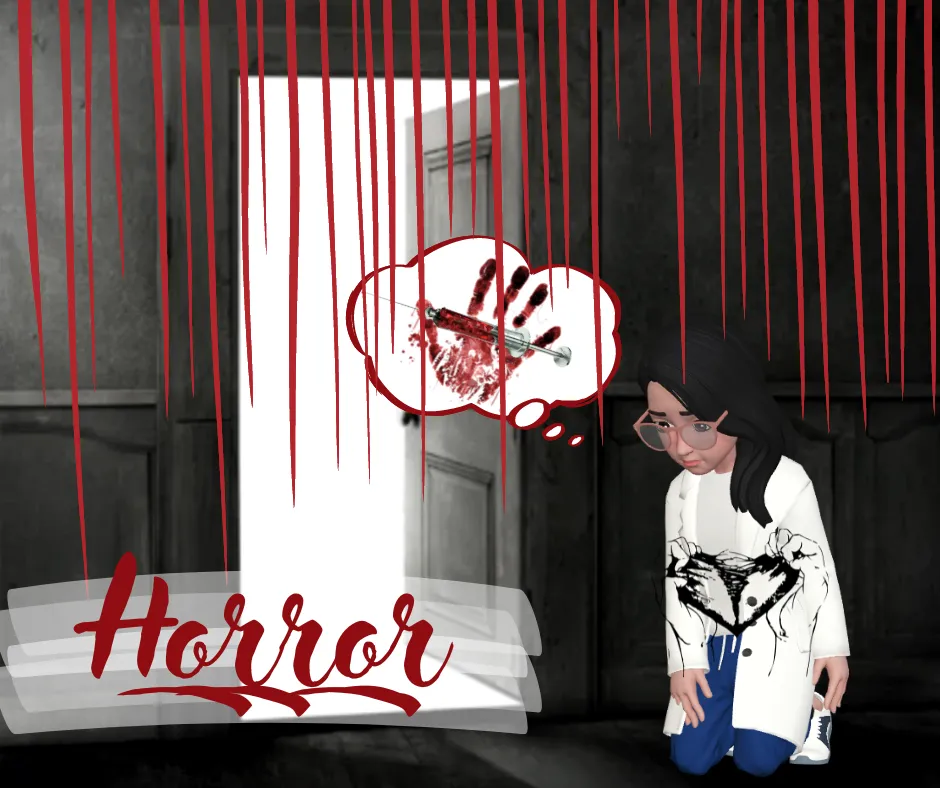

Después de eso me puse a analizar el otro extremo, el de mis colegas Gineco-Obstétras, mucha gente solicita que se legalice el aborto, de hecho, yo también estaba de acuerdo porque vi cosas terribles en los hospitales con niñas de 12 años por todos lados estando embarazadas sin tener ni ellas mismas para comer, mucho menos para mantener un niño y darle buena educación.
Pero, de repente, también me puse a pensar en esos colegas teniendo que asesinar a fetos o embriones intrauteros y sentí el dolor que muchos de ellos sentirían por acabar con una vida que ni siquiera vio la luz al nacer, así que por eso también me sentí ¡muy indignada! Siempre respeté el derecho de la mujer a decidir sobre su cuerpo, pero no había pensado que otros como yo tendríamos que pasar por este tipo de traumas al convertirnos literalmente en asesinos cuando estudiamos y nos comprometemos es a preservar la vida humana en cualquiera de sus etapas.
Esta semana pasada y ésta volvieron mis migrañas y no había encontrado la razón, pero ahora que escribo esto, lo entiendo; Estoy lidiando con este conflicto interno, porque me duele no poder ayudar a los familiares de la paciente que les comenté, me duele verlos sufrir, me duele no poder hacer más por la paciente que está también sufriendo probablemente, pero no me siento en capacidad de hacer eso y ahora me estoy replanteando todo lo que he pensado al respecto todo este tiempo.
¡Es duro amigos! En la carrera vemos una clase llamada "Dilemas morales en medicina" y esto forma parte de eso ¿Qué es lo que está bien? ¿Está bien aliviar el sufrimiento del familiar a costa de acabar con una vida que no ha decidido ser acabada?, ¿Está bien dejarlos a los 2 sufrir porque la persona enferma no está consciente ni en las condiciones para decidir?, ¿Está bien hacerlo si la persona enferma decide que quiere que lo hagan?, ¿Está bien que los médicos nos veamos en la obligación de acabar con una vida, de la forma que sea, para que otros se sientan mejor? ¿Aún sobre el trauma que eso implica para nosotros mismos? ¿Debemos pensar más en los otros que en nosotros mismos porque somos médicos?
Como esas son innumerable la cantidad de interrogantes con las que he lidiado estos días porque la señora sigue en estado de agonía, pero no ha decidido irse. En estos momentos algunos como yo nos acercamos más a la religión, a la fe, le decimos a los familiares que lleven a un pastor, a un padre, al representante que quieran de la religión que profesen, aferrándonos a esa ayuda superior, a que ella sea la que decida para que no tengamos que ser nosotros.
Hay algo que siempre he tenido claro y es que nosotros solo somos un instrumentos de esos Dioses, así lo pienso yo y lo piensan muchos de mis colegas que profesan una religión y a los que las situaciones se les salen de las manos, como a mí en este caso, y literalmente no sabemos más que hacer qué decir: "No hay nada más que hacer por ella, solo esperar que se decida ir" lo que realmente esperamos es que su alma decida descansar por Obra y Gracias de esos Dioses sin que tengamos que ser nosotros ese instrumento para alcanzar ese descanso eterno.
After that I started to analyze the other extreme, that of my OB/GYN colleagues, many people ask for abortion to be legalized, in fact, I also agreed because I saw terrible things in hospitals with 12 year old girls all over the place being pregnant without even having enough to eat, much less to support a child and give it a good education.
But, suddenly, I also started thinking about those colleagues having to murder fetuses or intrautero embryos and I felt the pain that many of them would feel for ending a life that did not even see the light at birth, so I also felt very indignant! I always respected a woman's right to decide about her body, but I had not thought that others like me would have to go through this kind of trauma by literally becoming murderers when we study and commit ourselves to preserve human life in any of its stages.
This past week and this week my migraines came back and I had not found the reason, but now that I am writing this, I understand; I am dealing with this internal conflict, because it hurts me not to be able to help the relatives of the patient I told you about, it hurts me to see them suffer, it hurts me not to be able to do more for the patient who is also suffering probably, but I do not feel in capacity to do that and now I am rethinking everything I have thought about it all this time.
It's tough folks! In the course we take a class called "Moral Dilemmas in Medicine" and this is part of that, what is right, is it right to relieve the suffering of the family member at the cost of ending a life that has not decided to be ended, is it right to let them both suffer because the sick person is not conscious or able to decide, is it right to do it if the sick person is not conscious or able to decide, is it right to do it if the sick person is not conscious or able to decide, is it right to do it if the sick person is not able to decide? Is it okay to do it if the sick person decides that he/she wants it done? Is it okay for us physicians to be obliged to end a life, in whatever way, so that others may feel better? Even about the trauma that this implies for ourselves? Should we think more of others than of ourselves because we are physicians?
Like those are innumerable the number of questions I have dealt with these days because the lady is still in a state of agony, but has not decided to leave. In these moments, some of us, like me, get closer to religion, to faith, we tell the relatives to take them to a pastor, to a father, to the representative they want of the religion they profess, clinging to that higher help, that she is the one who decides so that we do not have to be the ones to decide.
There is something that I have always had clear and it is that we are only an instrument of those Gods, that is what I think and what many of my colleagues who profess a religion think and to whom the situations get out of hand, like me in this case, and we literally do not know what to do but to say: "There is nothing more to do for her, just wait for her to decide to go " what we really hope is that her soul decides to rest by the Work and Graces of those Gods without us having to be that instrument to reach that eternal rest.

Thanks for stopping by and reading!

Todos los banners fueron creados por @liveofdalla usando Canvas y Picsart con recursos gratuitos de ambas Apps.
(Eng) All the banners were created by @liveofdalla using Canvas and Picsart with free resources from both Apps.
DeepL
